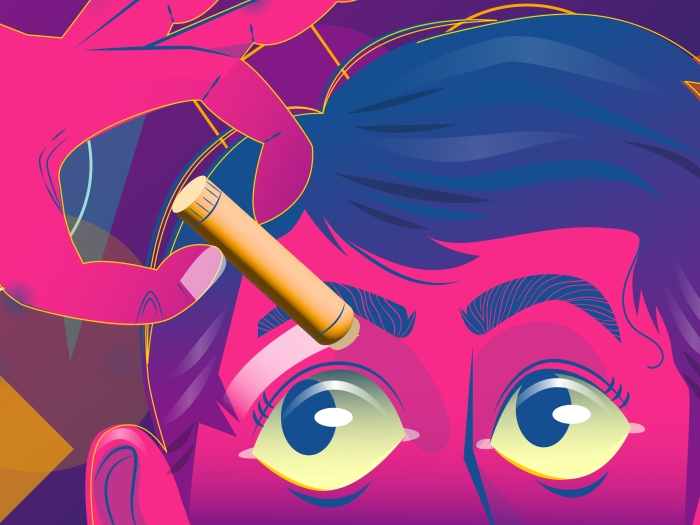Solar eclipses will offer a stunning sight; how to view it safely
2:00 PM
Author |
Total solar eclipses offer a rare — although brief — sight to millions when the sun disappears fully behind the moon. An otherwise bright summer sky will give way to total darkness.
Is it OK to have a peek?
The answer: not without the right protection.
MORE FROM MICHIGAN: Sign up for our weekly newsletter
"It's unsafe to look at the sun with your naked eye — or with conventional sunglasses, a smartphone, binoculars or a telescope," says Rajesh Rao, M.D., a retina surgeon and an assistant professor of ophthalmology and visual sciences at the University of Michigan Kellogg Eye Center.
That's because staring at the sun, no matter how small the sliver or length of time, can cause temporary (and sometimes permanent) vision damage.
"As doctors and ophthalmologists, we want to make sure everyone is taking proper precautions," Rao says. "We know there's a lot of excitement. People want to look."

Glasses for solar eclipse protection
Fortunately, you can watch an eclipse through specially designed glasses with solar filters.
Viewers, Rao says, should only purchase ones with an "ISO 12312-2" designation that indicate the product has met international safety standards (the American Astronomical Society has a list of approved brands). Discard any approved solar filters that have scratched surfaces and get a new pair.
SEE ALSO: Watch Out for These 5 Summer Eye Dangers
When to wear these solar filters depends on the phase of the eclipse, Rao says.
A moment called totality is the period when the sun's face is covered entirely by the moon and the sky is the darkest: the so-called "total eclipse." Before and after the total eclipse, the moon blocks only part of the sun's phase, a period called "partial eclipse."
When it's evident the partial eclipse has started, look away from the sun and put on the solar filters. Once the filters are on, you can look back at the partial eclipse.
Only during totality or total eclipse — which lasts less than three minutes — can the special glasses with solar filters be removed.
People can undergo retinal damage at the time when totality ends if they don't replace their eclipse glasses in time, said Julie Rosenthal, M.D., M.S., an opthalmologist and clinical associate professor of opthalmology and visual sciences.
"So while it may be safe, please pay attention and put your glasses back on well before the time that totality has ended,” she said.
Why you should protect your eyes from the sun
Our eyes are conditioned only to handle typical daylight conditions.
"The cells in the retina, the back part of the eye, are accustomed to light levels that are more consistent with our ambient light levels," Rao says. "Being indoors, for example, or going outside but not looking directly at the sun."
Looking directly at the sun without proper solar filters can quickly spell trouble.
Specific wavelengths of light within the sun's powerful rays can damage retina cells — namely, those in the fovea, a tiny pit in the central retina that facilitates high-acuity vision for reading, facial recognition and driving.
That damage can cause a partial retinal "hole" to develop, or other changes, in a condition called solar retinopathy. Depending on the length and extent of exposure, outcomes may vary. Blurred vision, wavy lines in vision or seeing spots could be temporary.
In other cases, the injury is permanent; eyesight won't return to normal.
Although most people know they shouldn't look directly at the sun, Rao understands that the forthcoming solar eclipse is a rare event that will draw many eyes skyward.
"Our main goal is that you enjoy this once- or twice-in-a-lifetime opportunity while protecting your eyes from a substantial chance of vision loss or blindness," he says.

Explore a variety of health care news & stories by visiting the Health Lab home page for more articles.

Department of Communication at Michigan Medicine

Want top health & research news weekly? Sign up for Health Lab’s newsletters today!





